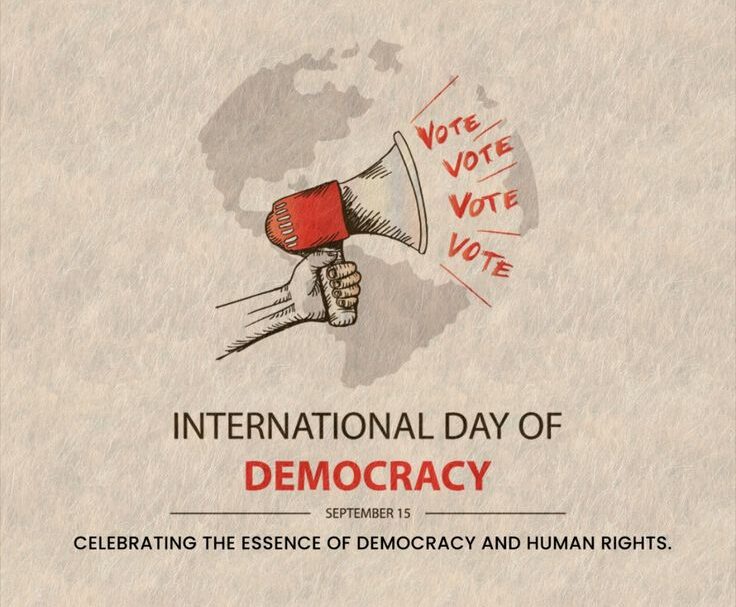International Day of Democracy: A Celebration of Freedom, Rights, and Participation
Introduction
International Day of Democracy: Democracy is one of the most cherished principles of governance, deeply rooted in the values of freedom, equality, and human rights. The International Day of Democracy, observed every year on September 15th, offers the world an opportunity to reflect on the progress made in democratic governance and the essential role it plays in ensuring the welfare and rights of citizens. Established by the United Nations in 2007, this day underscores the importance of democratic principles and advocates for the protection and promotion of democracy across the globe.
History of International Day of Democracy
The International Day of Democracy was proclaimed by the United Nations General Assembly in 2007 to raise awareness about the value of democracy and to encourage individuals, organizations, and governments to engage in actions that enhance democratic processes. This day encourages citizens around the world to advocate for democratic governance, ensure free and fair elections, and strengthen the institutions that uphold democratic values.
This day has its origins in the Universal Declaration of Human Rights, which proclaims that everyone has the right to participate in the political process. The International Day of Democracy is a reminder that democracy is not just about voting—it’s about inclusion, participation, equality, and freedom for everyone, regardless of race, gender, or social status.
Key Facts About Democracy and International Day of Democracy
- What is Democracy? At its core, democracy is a system of governance in which power is vested in the people. It operates on the principles of representation, where citizens elect leaders to make decisions on their behalf. In a democracy, citizens also enjoy fundamental freedoms, such as the freedom of speech, the right to assembly, and the freedom of press. Democracy is not a one-size-fits-all system; each nation’s democracy reflects its unique culture, history, and social structures.
- The Importance of Democracy: Democracy empowers individuals by giving them a voice in the decision-making processes that shape their society. It promotes peace and stability and plays a critical role in upholding human rights. Democracies allow individuals to express their opinions and dissent peacefully, ensuring that the government remains accountable to its citizens. A functioning democracy also fosters social and economic development, ensuring that the needs of all people are met.
- Global Challenges to Democracy: Although the benefits of democracy are clear, there are numerous challenges to its implementation and sustainability. From authoritarian regimes to political instability and electoral fraud, many countries still struggle with building and maintaining a true democratic system. The International Day of Democracy seeks to shine a spotlight on these challenges and encourage global cooperation to address them.
- Universal Participation: A true democracy cannot exist without the active participation of its citizens. The right to vote is central to any democracy, and on this day, governments and civil society organizations advocate for increasing voter participation. Ensuring that everyone—regardless of age, gender, or background—has equal access to the voting process is crucial for a fair democracy.
- Democracy and Human Rights: Democracy is deeply connected to the protection of human rights. Democratic systems are designed to uphold and protect the dignity and freedom of individuals, which is why the International Day of Democracy also highlights the role of human rights in democratic governance. By safeguarding human rights, democracies empower their citizens to lead fulfilling lives free from oppression and injustice.
Why Celebrate International Day of Democracy?
- Raising Awareness: The International Day of Democracy provides a platform to raise awareness about the importance of democratic governance. It allows people worldwide to reflect on the freedoms they enjoy and the progress that has been made in securing these rights.
- Promoting Participation: This day also encourages greater participation in democratic processes. Whether through voting, advocacy, or public debate, participation is key to ensuring that democracy remains strong and vibrant. The day emphasizes the importance of youth engagement in politics and policy discussions to ensure that the next generation has a voice in shaping the future.
- Celebrating Democratic Values: Democracy is not only about elections—it’s about the freedoms and rights people are entitled to in a democratic society. On International Day of Democracy, people celebrate the values of transparency, accountability, justice, and equality that are fundamental to any democracy. It is a day to affirm our collective commitment to these principles and to advocate for those still struggling for basic freedoms.
- Addressing Threats to Democracy: Unfortunately, many democracies around the world are facing significant challenges. On this day, it is essential to address threats such as corruption, the erosion of civil liberties, and the rise of authoritarian regimes. International Day of Democracy allows people and governments to take stock of these threats and renew their commitment to democratic principles.
- Supporting Global Cooperation: Democracy is a universal value that transcends borders. The International Day of Democracy encourages countries to work together in support of democracy and democratic institutions. It serves as a reminder that a thriving democracy benefits not only individual countries but the entire world by contributing to global peace and stability.
FAQs about International Day of Democracy
- Why is September 15th Chosen as the International Day of Democracy? September 15th was chosen because it marks the date in 1997 when the Inter-Parliamentary Union (IPU) held its first conference on democracy. Since then, the date has become synonymous with the celebration of democratic values.
- What is the Goal of the International Day of Democracy? The primary goal of this day is to raise awareness of the importance of democracy and its fundamental principles, including participation, human rights, and the rule of law. It also seeks to encourage greater public engagement in democratic processes.
- How Can I Get Involved? You can get involved by participating in local activities, supporting democratic initiatives, educating others about the importance of democracy, and voting in elections. You can also advocate for the protection and expansion of democratic rights both at home and internationally.
- What Are Some of the Key Challenges Faced by Democracies? Some of the key challenges faced by democracies today include political polarization, voter suppression, corruption, and the rise of populism. These issues undermine the integrity of democratic systems and require urgent attention from governments, civil society, and the global community.
Celebrating International Day of Democracy
On International Day of Democracy, individuals, governments, and organizations come together to celebrate the core values that sustain democratic systems. From raising awareness about the importance of voting to engaging in discussions on how to strengthen democracy, this day encourages active participation and reflects on the progress and challenges of democratic governance.
Conclusion
International Day of Democracy is a reminder of the importance of the principles of democracy in shaping a better future for all. It is a day to reflect on the progress we’ve made, to recognize the challenges that remain, and to affirm our collective commitment to ensuring that democracy remains a vibrant force for peace, freedom, and human dignity. As citizens of the world, we all have a responsibility to nurture and protect democratic values—today and every day.










